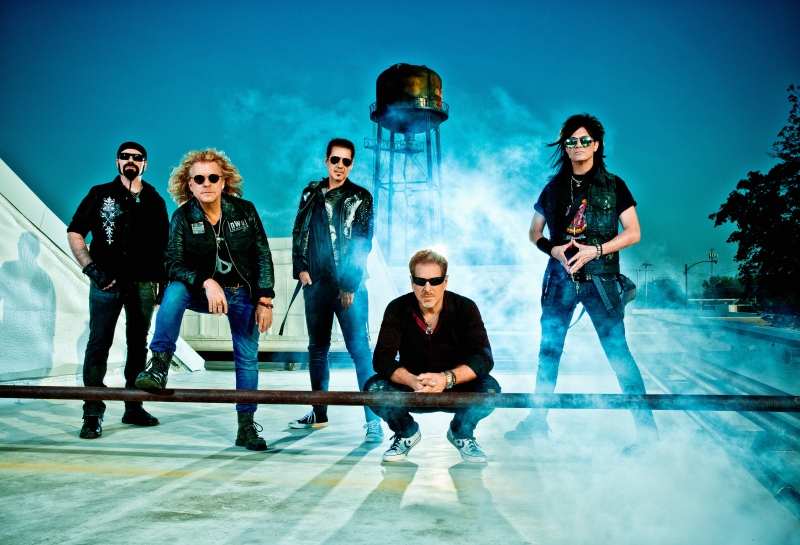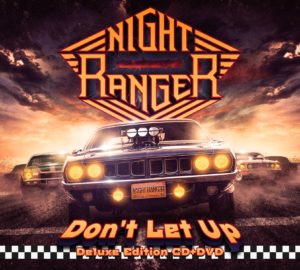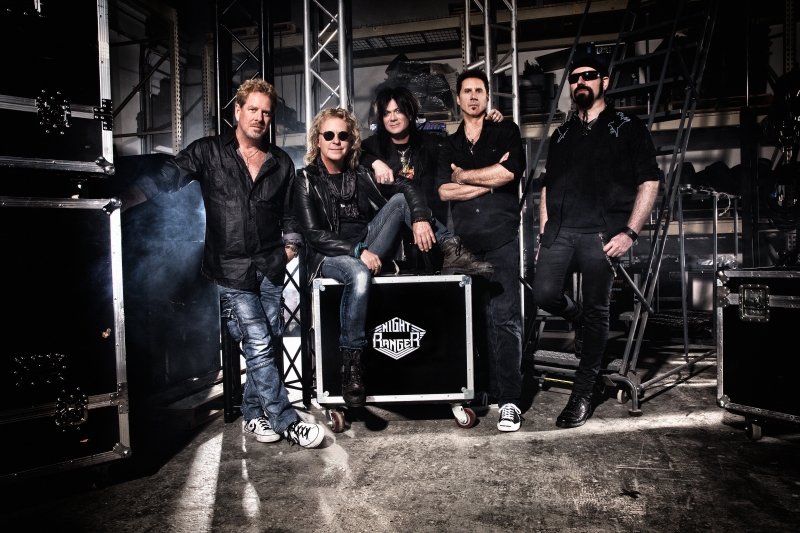
Night Ranger is one of those bands where, when you hear their big hits, they instantly transport you to a wonderful, wistful time and place – usually the 1980s.
For much of that decade, you could not turn on FM radio, MTV or MuchMusic without seeing and hearing the melodic hard rock stylings of this west coast band. From 1982 to 1988 Night Ranger released five studio albums, with two of them – 1983s Midnight Madness and 7 Wishes in 1985 – going platinum while the 1987 offering, Big Life went gold. Hit singles included Don’t Tell Me You Love Me, (You Can Still) Rock in America, When You Close Your Eyes, Sentimental Street, The Secret of My Success and the iconic Sister Christian (go ahead and sing it … ‘You’re motoring. What’s your price for flight. In finding mister right – You’ll be alright tonight.’)
Like many bands from that era, Grunge crushed their momentum and the Night Ranger split up, reconvening a couple of times with altered lineups until the three main founding members, drummer/singer Kelly Keagy, guitar whiz Brad Gillis and bassist/vocalist Jack Blades reconvened for good in 1996, releasing a couple of albums in the late 1990s.
Alter 2007s Hole in the Sun, the band took a different approach to writing at the same time as they began releasing records through European label Frontiers Music. Somewhere in California (2011), High Road (2014) and now the brand new record, Don’t Let Up (set to come out March 24 worldwide) sees Night Ranger having more fun, being more musically adventurous and producing some of the best music of their career.
“What has been interesting about the last three albums is that we have started the process with no songs at all. At most maybe we have had a chorus idea and just sung it into a phone. We got into a room and we just started with that blank page and we built a whole album – every time. We’re still amazed at the process. We would be like, ‘wow this is turning out to be a good song.’ And a couple of months later we’d be saying, ‘wow this is starting to become a good record.’ We feel very fortunate and I want to say very blessed. It’s not fake and even sometimes we don’t understand how and why it happens. But I think it’s because we know each other so well, we’re still driven, we’re still passionate and we really care about our music and care about what we’re doing,” said Keagy from his home in Nashville.
“And this time, another new thing for us was that we didn’t do the whole album together in the same room when it came to actually recording the tracks. We decided that since me, Jack and Brad all have our own studios and we all know that we can engineer or can get someone in to help us engineer, let’s just do it. Of course the writing sessions were all together, but this new way made sense. Instead of, for example everyone sitting around waiting for me to do my parts in the studio.
“We trust each other. We would all do our stuff at home and do our parts based on the pretty extensive templates that we made during the writing sessions. So basically we wrote the songs, recorded them as demos and then just went back and replaced the parts that we knew we wanted to do better. In that way it was kind of a blessing in disguise because when you can take a little more time on a part, you really get what you want and you are really happy with every aspect of the record.
While Night Ranger’s first album was released in 1982, the core trio of Keagy, Blades and Gillis have been performing together since they joined the band Rubicon in San Francisco in 1978, changing their name to Night Ranger when Rubicon splintered a year later. While like any long-time relationship there have been ups and downs, the trio truly are a band of brothers.
“It totally blows our minds to think we’re still doing this together after all these years. And then once we start talking about milestones and anniversaries, the silly stupid stories start to come out and the conversation goes downhill from there as we end up giggling like fools. And sometimes we just shake our heads. We will be having a good night and we ill just look at each other across the stage and I will see that gleam in Jack or Brad’s eyes and think, ‘wow, we have been on stage for 35 years looking at each other from the same angle. How did this all happen?’ And it happened because we became a tight family. We could always communicate with each other. We can always get through the hard times. And we’re still all pushing ourselves as musicians and songwriters,” Keagy said.
 “I am so proud that the three of us are still together as the focal point of this band. For every album we’ve ever done, it always starts with the three of us sitting at a room and looking at each other and saying, ‘what have you got?’ And the basic tracks have always been cut by the three of us, and those things have always been the basis for everybody else to put their parts on.”
“I am so proud that the three of us are still together as the focal point of this band. For every album we’ve ever done, it always starts with the three of us sitting at a room and looking at each other and saying, ‘what have you got?’ And the basic tracks have always been cut by the three of us, and those things have always been the basis for everybody else to put their parts on.”
Keagy also offered up praise for the two ‘new guys’ in the band: keyboardist Eric Levy, who joined in 2011, and guitarist Keri Kelli who did spot duty in the fall of both 2012 and 2013 before joining full time in 2014.
“Eric Levy had never played rock and roll before but he’s totally embraced it. He has always been more of a jazz fusion type player. And Keri was an established pro, but brought in a new perspective and a lot of energy. When you have been playing with the same guys for a long time it’s good to change the dynamic up once in a while. They came into this thing with the same kind of passion that we did, but they’re about 15 or 20 years behind us. With Keri in there, it adds so much musical muscle – his performance on record and especially onstage is flawless. I think he is an incredible musician. And for Eric to come in on the heels of really established guys like [long-time member and occasional Van Halen accompanist] Alan Fitzgerald and Michael Lardie [who left to join Great White] and come in and play the parts perfectly was amazing. We were actually thanking him after his first few shows because we were so impressed and so happy with him,” he said.
And like the new album title suggests, Night Ranger has no plans of letting up any time soon, according to Keagy.
“We’re absolutely looking at the long term. We never look at it like, ‘well we got through this year, what do you think?’ We are already planning stuff three years out. We’ve got to keep this going because this is all we know and music is way too important to us to just have it be a secondary thing in our lives. And I know it happens where people get back together and want to treat it as a fun hobby and that may be okay for them, but this is the only thing that we do. The side projects are fun and it is refreshing to play with other musicians, but there’s nothing like the feeling we get when we’re on stage together,” he said.
“If you could just hear the talk when we’re done playing a show, it’s like we’re 25 again because we’re all so fired up and excited. And we still send these crazy emails and texts back and forth – it’s like a lovefest. We are still so happy with what we’re doing and thank God for that. And one of the reasons is we don’t push it too hard. When we got back together in 1996 after being apart for a few years, we said we weren’t going to burn out on the road. We would get some core dates that would be the anchor for the tour and then expand the schedule around them in nearby places.
“That has been the saving grace for this band. We’re not going to get on a bus for weeks and weeks playing every little town in,  say, the Midwest. Let’s just do Friday, Saturday, Sunday or sometimes Thursday, Friday, Saturday and Sunday and then go home to regain our energy and get fired up for the next weekend and make it fresh. That’s what we did and we’ve been doing it like that ever since.”
say, the Midwest. Let’s just do Friday, Saturday, Sunday or sometimes Thursday, Friday, Saturday and Sunday and then go home to regain our energy and get fired up for the next weekend and make it fresh. That’s what we did and we’ve been doing it like that ever since.”
And in the day and age where many rock bands don’t see the point of spending the time to write and record a full album because of the precipitous decline in record sales, Keagy said he, Blades and Gillis will never stop writing and recording new music.
“We first got this band together because we liked playing music – especially our own music. It was never about the sales or the money. We would go and play a gig and we would each make $25, but we were more stoked about how the show went and what Brad did in a song, or a drum part that the crowd loved. It was all about the passion of making music together and it’s still that way with us,” he said.
“I don’t want to sound corny or whatever because there isn’t that much money in making records any more and they’re really hard to do these days, but after you have made so many records and have a history going back more than 35 years you wonder what do you do to still be creative and what do you write about and still like it. Well I think it comes out of that initial passion of loving to play music and take it from there.
“With the new approach we’ve taken over the last three records of coming in kind of cold to the writing process, it’s really created some amazing ideas once we’ve started to jam together. And that gets us fired up again about making a new record. And we still want to make sure it’s a great record. With Don’t Let Up, and any of our past catalogue, we would never put a thing out unless we believe in it and stand by what we have written and recorded. We like to write new stuff and the fans love it. And even if it’s not as many fans, we’re still reaching our core audience which loves to hear new stuff from us. That’s the bottom line: it’s a creative passion from us and it’s a passion coming back to us from the audience saying, ‘we love your new stuff, let’s hear more of it.’”
For more information on the band, on Don’t Let Up and upcoming tour dates, visit https://nightranger.com.
- Jim Barber is a veteran award-winning journalist and author based in Napanee, ON, who has been writing about music and musicians for a quarter of a century. Besides his journalistic endeavours, he now works as a communications and marketing specialist. Contact him at jimbarberwritingservices@gmail.com.
